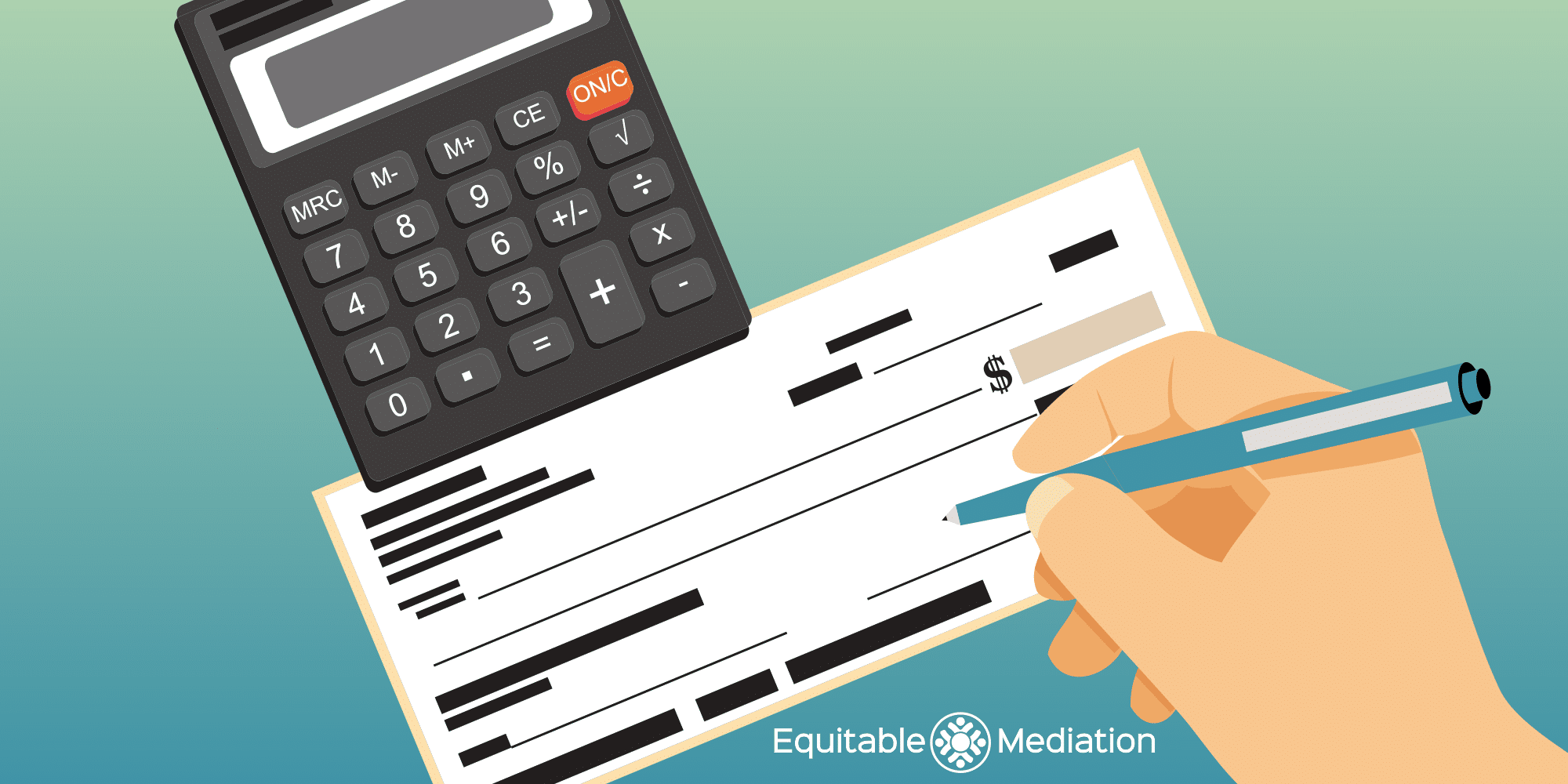Ask anyone who’s been ordered to pay spousal support how they feel about having to write a check to their former spouse every week or month. You’ll probably be met with a few choice words… The fact is – most people want to just move on after a divorce, sever ties and go their separate ways.
Unfortunately, when monthly alimony payment is involved, it can feel for the paying spouse as if this separation never truly happened, which can ultimately lead to frustration and bitterness on the part of the payer. That’s why some divorcing spouses choose an alternative to the weekly “check in the mail” alimony approach.
A concept known as a lump sum alimony buyout.
What is lump sum alimony or an alimony buyout?
Simply put, a buyout (sometimes called lump sum alimony or spousal support buyout or spousal maintenance buyout) is the payment of alimony or its equivalent in one lump sum payment, rather than through limited duration or permanent periodic alimony payments made over the course of a designated time frame.
This support can be done in the form of a cash lump sum payment, where the paying spouse writes one check for the entire amount of spousal support he or she will owe to the supported spouse, or it can be done through marital property division (also referred to as equitable distribution or community property division depending on where you live). When it’s the latter, one party basically agrees to give up an additional portion of the assets during the property division to the other spouse, in lieu of paying durational alimony.
There are a few things you need to understand about the challenges of determining a lump sum alimony agreement:
- Since today’s value of a lump sum alimony buyout will be less than the total of the periodic alimony payments, how can you make sure the support award amount you agree on is fair?
- How do you and your spouse determine the discount rate used to calculate the present value of the alimony buyout? Especially if the two of you have different tolerances for risk?
- Unlike periodic payments that can be suspended or terminated upon cohabitation or re-marriage by the receiving spouse, how would that be addressed in the case of an alimony buyout award?
- What happens if you want to convert durational periodic alimony payment to a lump sum alimony payment in the future? Can you do that? And if so, how would that work?
- Since some states, like California, Illinois, and New Jersey allow periodic alimony payments to be deducted for State tax purposes, but not lump sum alimony buyouts, how do you account for the difference in tax treatment of these two support approaches?
- There’s more than meets the eye when it comes to calculating a lump sum alimony buyout payment and it isn’t as straightforward as it may seem. This is far too complicated an issue to attempt on your own.
That’s why the best way to determine if this type of support solution is right for you, and come to an agreement you and your soon-to-be ex think is fair, is to work with an expert divorce mediator with a financial acumen like me.
Calculating a lump sum payment for the alimony buyout amount is difficult.
Especially since the lump-sum payment paid now, may not necessarily match the total of the periodic monthly payment.
Because while it does involve taking the award amount of each periodic payment and multiplying that by the number of payments that would be due if alimony was to be paid out over time, there are a number of other factors that are used to help determine the “present value” of the lump sum payment. One such factor is what’s commonly referred to as the “discount rate.”
Investopedia defines the discount rate as:
The interest rate used in discounted cash flow analysis to determine the present value of future cash flows.
The idea being that if you pay your ex-spouse a lump sum payment, they could invest that income and earn interest on it. Ending up at the end of the term (in theory) with the same amount of money had you paid out their spousal support in a more traditional manner.
Agreeing on a discount rate can be a real challenge.
Perhaps you’re a person who has a high tolerance for risk. And over time, feels that in exchange for that risk, you could earn a high rate of return. So in your world, the lump sum alimony buyout amount you would offer your soon-to-be-ex would be low. Your thinking being, at a good rate of return, the payee spouse could turn that lump sum support into a nice chunk of change.
On the other hand, perhaps your spouse is more conservative, so the opposite holds true. They’d want a higher alimony buyout amount as they are expecting a lower rate of return on that investment.
Beware the complications of cohabitation or re-marriage!
In a traditional alimony arrangement, it’s not uncommon for alimony to be suspended when the recipient spouse is cohabitating. And when they remarry, alimony is irrevocably terminated. No more alimony payments made or received.
So what happens in the case of an alimony buyout when a year or two later, the recipient spouse gets remarried? Since they’ve already got the money, there’s no turning off the faucet and stopping the periodic alimony payment. What do you do then? Something tells me they’re going to be unwilling to give back that income once they’ve got it.
If you’re the paying spouse, you’re willing to pony up your fair share. But you also don’t want to give away money to someone who under different circumstance, wouldn’t qualify to receive that income.
Don’t forget about the challenges of conversion. And the potential tax consequence that may come along with it.
If after you’re divorced, you try and convert your periodic alimony payments to a lump sum alimony buyout, there are a number of challenges you will face. For one, you may find yourself arguing with your now ex-spouse on what an appropriate alimony buyout amount should be.
Second is the issue of whether a buyout is even possible as maybe they’re not comfortable investing in the market, lack an understanding of how discounting works, or are happy with the perceived security receiving monthly installments gives them.
And finally there’s the potential for tax consequences. One minute your ex-spouse has $500 in their bank account, and the next they have $50,000. Don’t think Uncle Sam is going to take a long, hard look at that and wonder where that money came from?
But if you think you may want to offer a buyout down the road, you need to agree now on how the process would work at a future point in time. Not an easy task for two people presently at odds with each other. And who aren’t highly-skilled divorce professionals! So for these, and many other reasons, determining a fair buyout amount is not something you should attempt to do on your own.
Why consider a buyout of alimony?
There are a number of reasons why someone would consider an alimony buyout. If you’re the one paying alimony, perhaps you want to make a career change, or your job is at risk, so your salary may be greatly reduced in the near future.
You see, if your earnings were higher while you were married, and your monthly alimony payments were based on your previous level of earnings, you may simply not have the funds to make that level of alimony payments in the future. Or maybe you’re planning on getting remarried soon, and you don’t feel comfortable making alimony payments to your ex-spouse while married to your new spouse. And then there’s the simplest explanation of them all: you simply don’t like making alimony payments. And you just want your obligation over and done with. All of these are common reasons for considering an alimony buyout.
And if you’re the spouse receiving alimony? A lump sum alimony buyout may have advantages for you as well. For one, you won’t have to constantly rely on your ex-spouse to make payments. Especially with high-conflict couples, there is a risk that your ex could suddenly decide to flat-out stop paying alimony. You’d then have no choice but to go to court to enforce your agreement. Or maybe you want to buy a place of your own. And having a lump sum to use as a down payment would allow you to more quickly move forward. And finally, while you may not have immediate plans to remarry, perhaps you see yourself getting remarried before your alimony ends.
Taking a lump sum buyout could possibly provide you with a greater amount of money than if you had simply taken the periodic payments, and had them terminate upon your cohabitation or remarriage. By choosing instead to settle on a one-time payment, or a disproportionate share of assets during the divorce, both parties are able to effectively end their dealings with one another (assuming there are no children involved) and move forward.
This often results in a more amicable resolution, avoiding years of potential bitterness and animosity between ex-spouses.
There is more than meets the eye when it comes to lump sum alimony buyout.
While I’ve done my best to give you the highlights, every couple’s situation, circumstances, and determining factors are unique and this is not a one-size-fits-all topic. This issue of an alimony buyout is much too complex for you to attempt to determine on your own, because there’s a lot involved in this highly complex matter.
Not only that, but there are a lot of places you can make costly mistakes.
The best way to determine if an alimony buyout is right for you is to mediate your divorce or separation with me.
Using my extensive financial knowledge into the complex matters of alimony, as your mediator, I will:
- Explain in detail the pros and cons of each approach to help you determine which type of alimony may work best in your particular situation;
- Work with you to determine if a buyout is feasible and what an appropriate amount would be;
- Discuss and help you define what (if any) conditions exist that could modify the lump sum payout;
- Help you understand the tax implications of such a payout;
- Explain how child support factors into the buyout calculation;
- Ensure the proper agreements are reached and documented to govern the conditions of such a buyout between you and your spouse;
And ultimately, help you and your spouse negotiate a solution out of court that’s fair, works for both of you and will best enable both of you to meet your financial obligations after you’re divorced.





